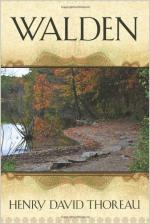|
|
Walden Brute Neighbors
William Ellery Channing often fishes with Thoreau. He begins this chapter by creating an imaginary dialogue between the Hermit (himself) and a Poet (Ellery Channing) based on their visits. He begins as the Hermit is interrupted by the Poet while thinking about how the world is doing, knowing that he hasn't heard any civilized noise for some time. He can't imagine living in a place where you can't think because the dog is barking too loudly.
The Poet enters with a rustling of leaves, talking about the clouds. He invites the Hermit to go fishing, which the Hermit can't resist, because his food supply is low. First though, the Hermit asks to be left alone to finish thinking while the Poet digs for bait. The Hermit goes back to thinking, trying to find his frame of mind, and thinks of sentences from Confucius, but never gets to recite them. The Poet returns, and off they go to Concord to fish.
Thoreau follows with some close observations of animals:
A squirrel that nibbles from his hand; a phoebe and a robin.
A partridge, who trains her young to be absolutely still until the mother gives a sign, and who blend in well with the leaves on the forest floor. They have ageless eyes that particularly stir Thoreau.
An otter, and a raccoon who live near his cabin.
The woodcock, who comes to the spring where Thoreau gets water and sits reading some days. She would circle him if he came near her chicks.
He recounts an ant battle - red ants vs. black, which he saw taking place on his woodpile. He watched for a while, then brought two red ants and one black one who were fighting together inside to the windowsill. They all were very hurt, but the red ones, which were much smaller, both got killed after half an hour inside. The black one walked away, but Thoreau isn't sure if he survived. He likened what he saw to the Battle of Bunker Hill in Boston (during the Revolutionary War), and imagined that the ants had their own trumpets and battle cries, just like men do.
Historically, observed ant battles have been recorded by famous human leaders and warriors, so Thoreau records this one for posterity. It took place during the Polk presidency, five years before Webster's Fugitive-Slave bill.
He speaks of wild cats. He is especially fascinated by the "winged" cat, owned by a nearby farmer who wasn't in when he came to call. Instead, Thoreau took some of its shed wings of matted fur, and kept them. He would have liked to have a winged cat as well as horse (poets are supposed to ride on Pegasus, a winged horse, in Greek Mythology).
He describes the loon and the hunters. The stormy October weather thwarts their hunting attempts, as if in concert with the loon. He dives deep and long, and can keep going like that for hours - never to be discovered or caught. He never tires of this constant back and forth. However, Thoreau is most impressed by the loon's howls, which are eerie, almost human-sounding. Like the owl, the loon can make that human sound.
He observes a group of ducks who would settle for a short while, but then be off. They seemed to come to Walden for the pleasure of it, more than for any practical reason.




